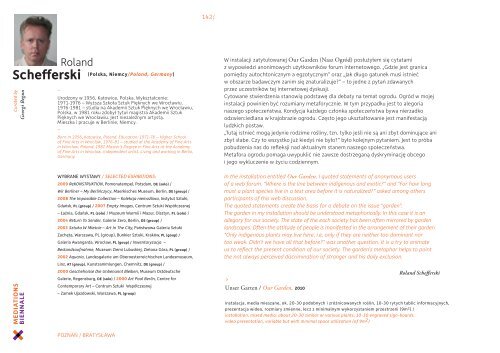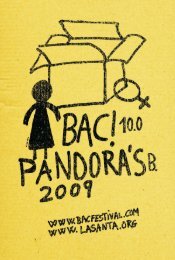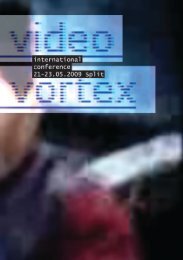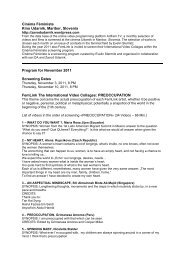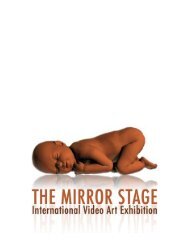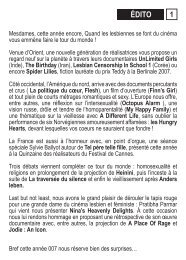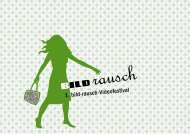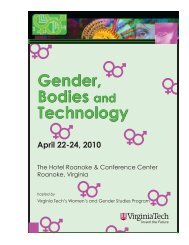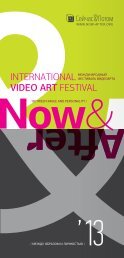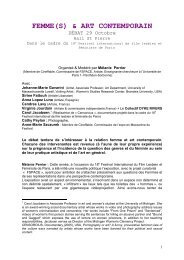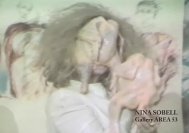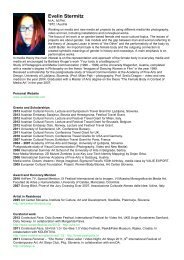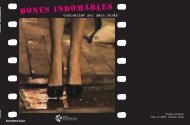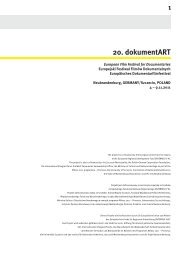PoznaÅ
PoznaÅ
PoznaÅ
You also want an ePaper? Increase the reach of your titles
YUMPU automatically turns print PDFs into web optimized ePapers that Google loves.
142/<br />
_<br />
Roland<br />
Schefferski<br />
Curated by<br />
Georgi Begun<br />
(Polska, Niemcy/Poland, Germany)<br />
Urodzony w 1956, Katowice, Polska. Wykształcenie:<br />
1971-1976 – Wyższa Szkoła Sztuk Pięknych we Wrocławiu.<br />
1976-1981 – studia na Akademii Sztuk Pięknych we Wrocławiu,<br />
Polska, w 1981 roku zdobył tytuł magistra Akademii Sztuk<br />
Pięknych we Wrocławiu. Jest niezależnym artystą.<br />
Mieszka i pracuje w Berlinie, Niemcy.<br />
_<br />
Born In 1956, Katowice, Poland. Education: 1971-76 – Higher School<br />
of Fine Arts in Wroclaw, 1976-81 – studied at the Academy of Fine Arts<br />
in Wroclaw, Poland, 1981 Master‘s Degree in Fine Arts at the Academy<br />
of Fine Arts in Wroclaw. Independent artist. Living and working in Berlin,<br />
Germany.<br />
WYBRANE WYSTAWY / SELECTED EXHIBITIONS:<br />
2009 ReKONSTRUKTION, Pomonatempel, Potsdam, DE (solo) /<br />
Wir Berliner – My Berlińczycy, Maerkisches Museum, Berlin, DE (group) /<br />
2008 The Impossible Collection – Kolekcja niemożliwa, Instytut Sztuki,<br />
Gdańsk, PL (group) / 2007 Empty Images, Centrum Sztuki Współczesnej<br />
– Łaźnia, Gdańsk, PL (solo) / Muzeum Warmii i Mazur, Olsztyn, PL (solo) /<br />
2004 Return To Sender, Galerie Zero, Berlin, DE (group) /<br />
2003 Sztuka W Mieście – Art In The City, Państwowa Galeria Sztuki<br />
Zachęta, Warszawa, PL (group), Bunkier Sztuki, Kraków, PL (goup) /<br />
Galeria Awangarda, Wrocław, PL (goup) / Inwentaryzacja –<br />
Bestandsaufnahme, Muzeum Ziemi Lubuskiej, Zielona Góra, PL (group) /<br />
2002 Aquaria, Landesgalerie am Oberoesterreichischen Landesmuseum,<br />
Linz, AT (group), Kunstsammlungen, Chemnitz, DE (group) /<br />
2000 Geschehnisse Die Unbenannt Bleiben, Museum Ostdeutsche<br />
Galerie, Regensburg, DE (solo) / 2000 Art Pool Berlin, Centre for<br />
Contemporary Art – Centrum Sztuki Współczesnej<br />
– Zamek Ujazdowski, Warszawa, PL (group)<br />
W instalacji zatytułowanej Our Garden (Nasz Ogród) posłużyłem się cytatami<br />
z wypowiedzi anonimowych użytkowników forum internetowego. „Gdzie jest granica<br />
pomiędzy autochtonicznym a egzotycznym” oraz „Jak długo gatunek musi istnieć<br />
w obszarze badawczym zanim się znaturalizuje?” – to jedne z pytań zdawanych<br />
przez uczestników tej internetowej dyskusji.<br />
Cytowane stwierdzenia stanowią podstawę dla debaty na temat ogrodu. Ogród w mojej<br />
instalacji powinien być rozumiany metaforycznie. W tym przypadku jest to alegoria<br />
naszego społeczeństwa. Kondycja każdego członka społeczeństwa bywa nierzadko<br />
odzwierciedlana w krajobrazie ogrodu. Często jego ukształtowanie jest manifestacją<br />
ludzkich postaw.<br />
„Tutaj istnieć mogą jedynie rodzime rośliny, tzn. tylko jeśli nie są ani zbyt dominujące ani<br />
zbyt słabe. Czy to wszystko już kiedyś nie było?” było kolejnym pytaniem. Jest to próba<br />
pobudzenia nas do refleksji nad aktualnym stanem naszego społeczeństwa.<br />
Metafora ogrodu pomaga uwypuklić nie zawsze dostrzeganą dyskryminację obcego<br />
i jego wykluczenie w życiu codziennym.<br />
In the installation entitled Our Garden, I quoted statements of anonymous users<br />
of a web forum. “Where is the line between indigenous and exotic?” and “For how long<br />
must a plant species live in a test area before it is naturalized?” asked among others<br />
participants of this web discussion.<br />
The quoted statements create the basis for a debate on the issue “garden”.<br />
The garden in my installation should be understood metaphorically. In this case it is an<br />
allegory for our society. The state of the each society has been oen mirrored by garden<br />
landscapes. Oen the attitude of people is manifested in the arrangement of their garden.<br />
“Only indigenous plants may live here, i.e. only if they are neither too dominant nor<br />
too weak. Didn’t we have all that before?” was another question. It is a try to animate<br />
us to reflect the present condition of our society. The garden’s metaphor helps to point<br />
the not always perceived discrimination of stranger and his daily exclusion.<br />
><br />
Unser Garten / Our Garden, 2010<br />
Roland Schefferski<br />
instalacja, media mieszane, ok. 20-30 podobnych i zróżnicowanych roślin, 10-30 rytych tablic informacyjnych,<br />
prezentacja wideo, rozmiary zmienne, lecz z minimalnym wykorzystaniem przestrzeni (9m 2 ) /<br />
installation, mixed media: about 20-30 similar or various plants, 10-30 engraved sign-boards,<br />
video presentation, variable but with minimal space utilization (of 9m 2 )<br />
POZNAŃ / BRATYSŁAWA


